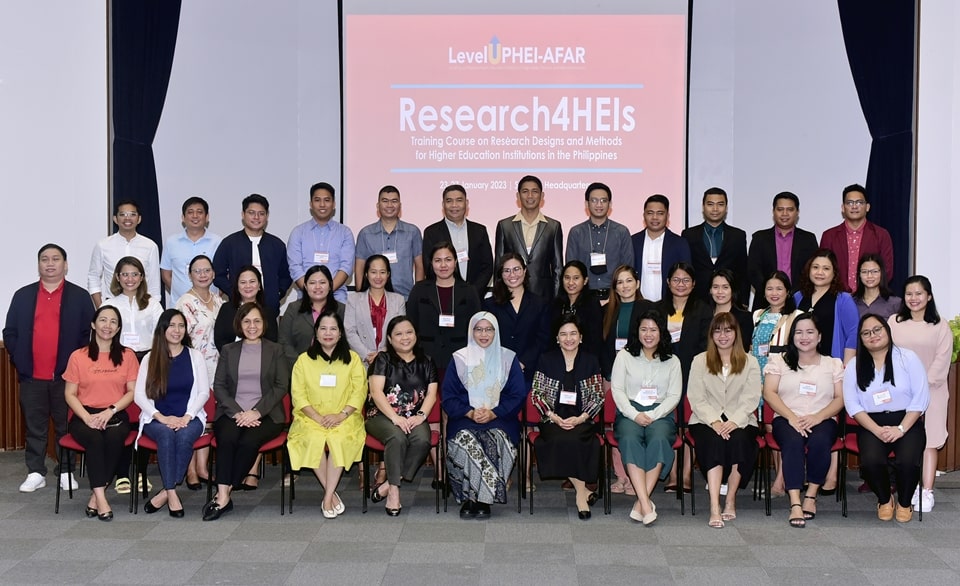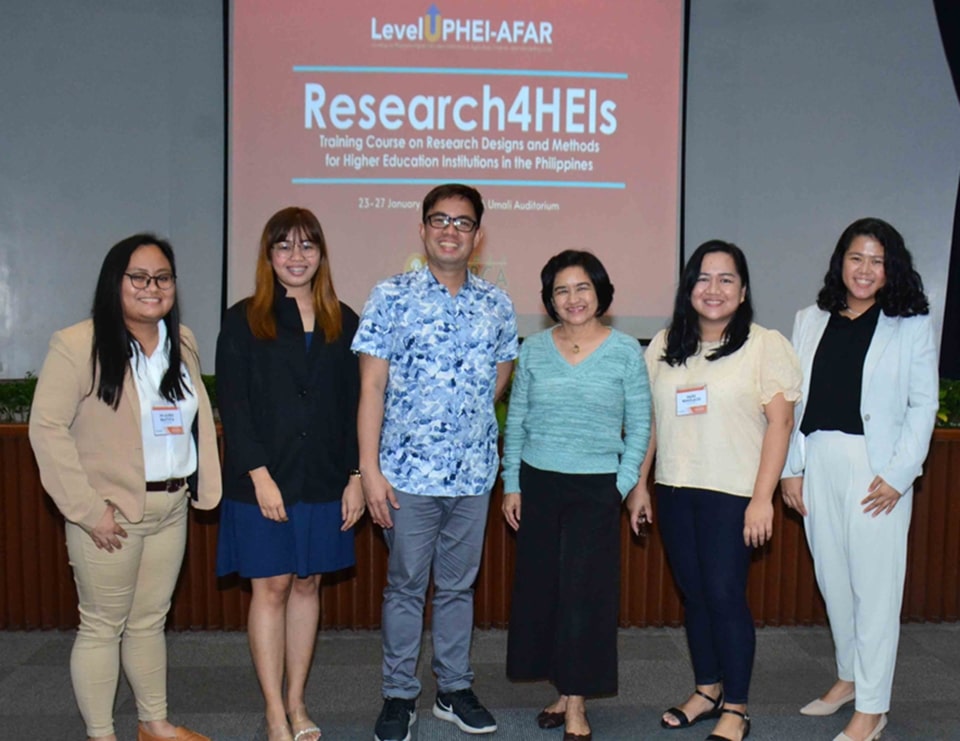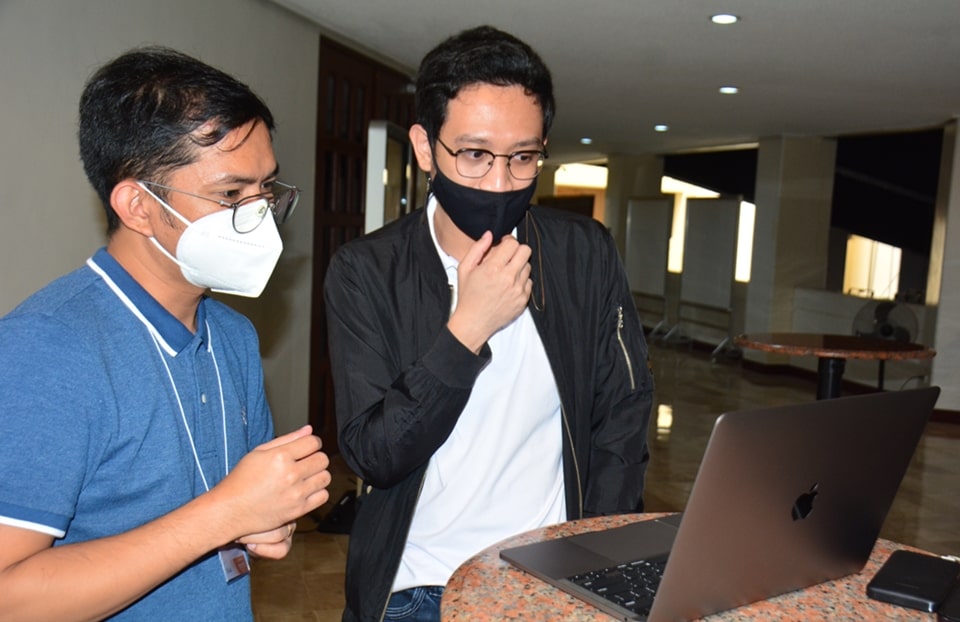The Southeast Asian Regional Center for Graduate Study and Research in Agriculture (SEARCA), in partnership with the Philippine Commission on Higher Education (CHED), conducted an in-person Training Course on Research Designs and Methods for Higher Education Institutions in the Philippines (Research4HEIs) from 23 to 27 January 2023 at the SEARCA Headquarters in Los Baños, Laguna, Philippines. With 21 participants representing 17 higher education institutions that are members of the State Universities and Colleges – Association of Colleges of Agriculture in the Philippines, Inc. (SUC-ACAP, Inc.), the training course aimed to build the capacity of the participants to develop a framework for their research, with focus on their objectives/hypotheses with a keen knowledge of the situations/conditions under which they are to conduct their research.
 Representatives from academic institutions across the country pose for a group photo with SEARCA heads, resource persons, and organizers during the opening of the Research4HEIs on 23 January 2023 at the SEARCA Headquarters.
Representatives from academic institutions across the country pose for a group photo with SEARCA heads, resource persons, and organizers during the opening of the Research4HEIs on 23 January 2023 at the SEARCA Headquarters.
SEARCA Deputy Director for Programs, Assoc. Prof. Ts. Dr. Nur Azura Binti Adam, welcomed the participants and underscored the importance of research and a knowledge-driven growth, especially for an academic institution’s sustainability and development. She added that “the quality of research work directly translates to the quality of teaching and learning in the classroom, benefiting not only the students and the institution, but the society, the country, and to a certain extent, the region as well. HEIs are knowledge hubs, where innovation can thrive.”
 Dr. Maria Ana Quimbo (4th from left), Training Course on Research4HEIs Technical Coordinator and Lead Faculty, pose for a photo with the Resource Persons from UPLB, namely (L-R): Ms. Mi-Auree Bautista, Ms. Lysette Aguila, Dr. Mark Oliver Llangco, Ms. Hazel Remolacio, and Asst. Prof. Angelyn Mananghaya.
Dr. Maria Ana Quimbo (4th from left), Training Course on Research4HEIs Technical Coordinator and Lead Faculty, pose for a photo with the Resource Persons from UPLB, namely (L-R): Ms. Mi-Auree Bautista, Ms. Lysette Aguila, Dr. Mark Oliver Llangco, Ms. Hazel Remolacio, and Asst. Prof. Angelyn Mananghaya.
On the other hand, Dr. Maria Ana Quimbo, Technical Coordinator and Lead Faculty, and Professor at the Institute for Governance and Rural Development, College of Public Affairs and Development (CPAf), University of the Philippines Los Baños (UPLB), gave an overview and schedule of the five-day training-workshop that included nine discussion sessions on quantitative and qualitative research designs, as well as mixed methods research design. Reflecting on their experiences in the online version of the course, Dr. Quimbo hoped that there will be better engagement with the participants in the current face-to-face modality, despite the tight schedule.
 Ms. Jamina Siso, Instructor, Kalinga State University, in a mentoring session with Asst. Prof. Angelyn Mananghaya (standing) and Ms. Lysette Aguila, Resource Persons from the Institute of Statistics, College of Arts and Sciences, UPLB.
Ms. Jamina Siso, Instructor, Kalinga State University, in a mentoring session with Asst. Prof. Angelyn Mananghaya (standing) and Ms. Lysette Aguila, Resource Persons from the Institute of Statistics, College of Arts and Sciences, UPLB.
 Mr. Angelbert Cortes (left), Instructor, Cavite State University, consults with Asst. Prof. Edrun Gayosa, Resource Person from the Institute of Statistics, College of Arts and Sciences, UPLB, regarding the methodology of his research proposal titled, “Starter Culture Development and Its Impact on the Microbiome and Metabolic Profiles in Coffee Fermentation.”
Mr. Angelbert Cortes (left), Instructor, Cavite State University, consults with Asst. Prof. Edrun Gayosa, Resource Person from the Institute of Statistics, College of Arts and Sciences, UPLB, regarding the methodology of his research proposal titled, “Starter Culture Development and Its Impact on the Microbiome and Metabolic Profiles in Coffee Fermentation.”
One of the highlights of the program was the one-day mentoring and coaching session with Resource Persons from the UPLB Institute of Statistics and the Department of Social Sciences of the College of Arts and Sciences. At the end of the training course, the participants presented their draft research proposals which were categorized into “experimental” and “non-experimental” research studies. Mr. Angelbert Cortes, Instructor and Researcher, Department of Biological Sciences, Cavite State University-Don Severino delas Alas Campus, and Dr. Justine Bennette Millado, Faculty, Department of Pest Management, College of Agriculture and Food Science, Visayas State University, Baybay, Leyte, won the Best Research Proposal presentation (Experimental Research category) for their proposed studies on “Starter Culture Development and Its Impact on the Microbiome and Metabolic Profiles in Coffee Fermentation” and “Production of Insect Immatures as Dietary Protein Source for Livestock and Poultry in Eastern Visayas”, respectively. For the non-experimental research category, Dr. Rosanilio Yagos, Program Chair, School of Agriculture, Forestry and Environmental Studies, JH Cerilles State College, Zamboanga del Sur, has been chosen as Best Research Proposal Presentation for his proposed study on “Fish Fauna and the Physico-Chemical Characteristics of Rivers in Bayog, Zamboanga del Sur.”
The training is under the CHED-funded project “Leveling-Up Higher Education Institutions in Agriculture, Fisheries, and Natural Resources (LevelUPHEI AFAR),” and was organized and implemented through SEARCA’s Education and Collective Learning Department-Training for Development Unit (ECLD-T4DU), with assistance from the Management Information Services Unit (MISU).